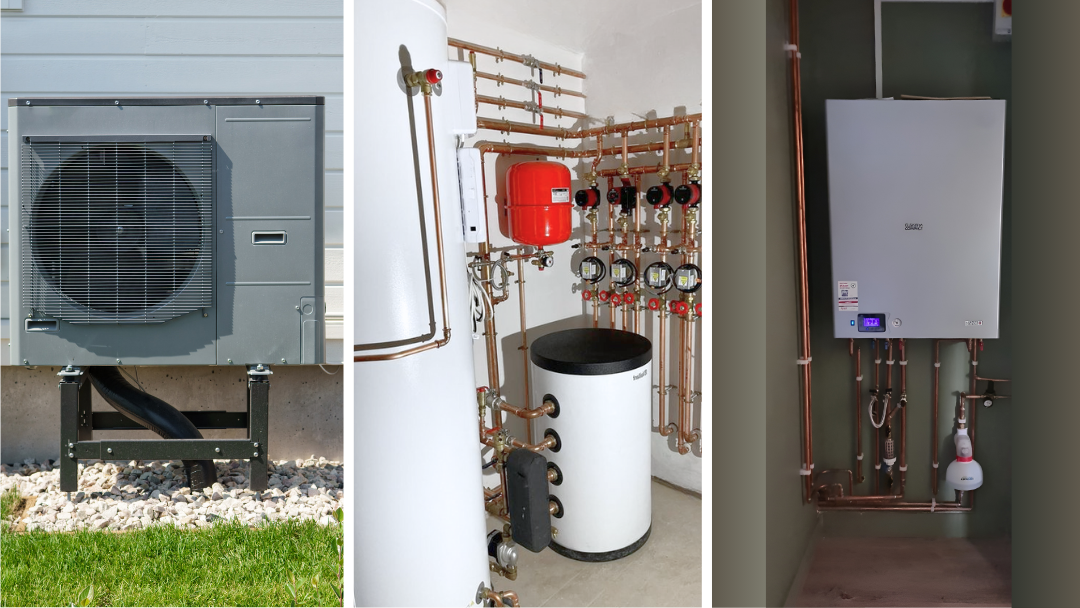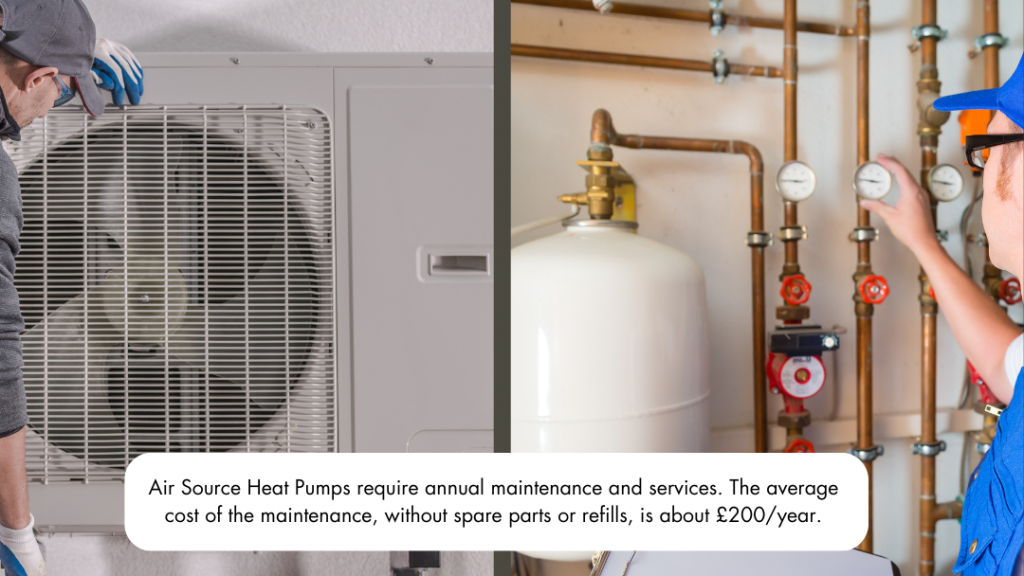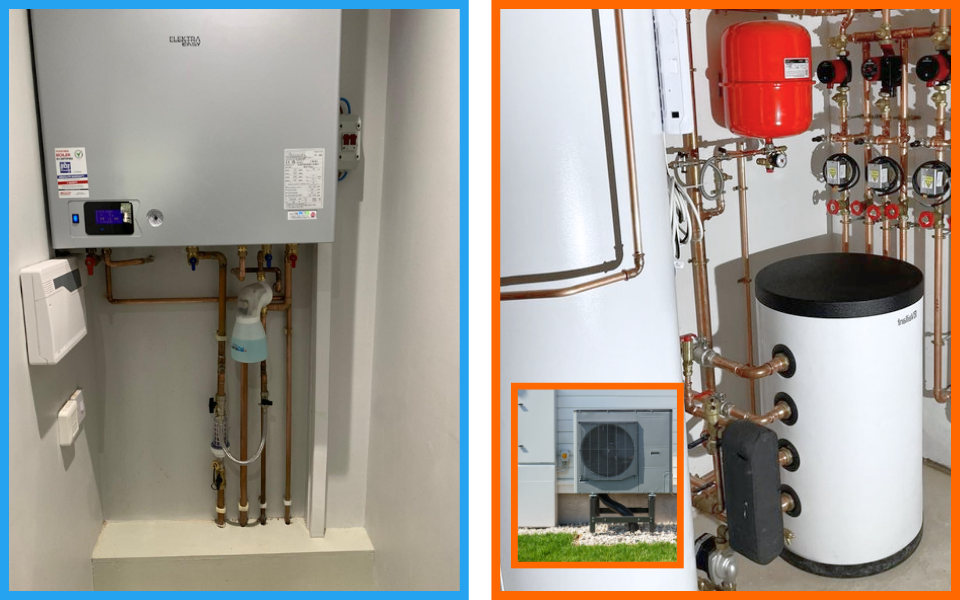blog
CLICK HERE To Choose The Right Boiler For Your Property

Selecting the right heating solution for your home isn’t just about ticking boxes; it’s about finding the perfect fit for your budget, lifestyle, and sustainability goals. In this post, we’ll compare our 12kW Elektra Easy.BPL electric combi boiler head-to-head against an air source heat pump (ASHP) paired with a 200L hot water storage tank, the most recommended alternative for UK homes: Let’s dive into the key factors—costs, efficiency, and impact—so you can make the most informed choice.
The average UK household consumes about 2,700 kWh of electricity and 11,500 kWh of gas annually. Typically, around 9,200 kWh is used for heating and hot water in a typical three-bedroom home and a 2.4 average occupancy.
When comparing the initial costs, the differences are substantial:
| Features | Air Source Heat Pump (ASHP) | 12kW Electric Combi Boilers |
|---|---|---|
| Appliance cost | £8,000 to £14,000 | £1,900 |
| Installation Cost | £4,500 to £6,000 | £1500 (average) |
| Additional costs (home refurb, change radiators, etc) | £1000 to £5000 | £150 (CH Filter, Isolator switch, MCB, Water Treatment System) |
| 200 litres hot water tank | £1,500 | n/a |
| Estimate Total Cost | £15,000 to £26,500 | £3,550 |
Our ELEKTRA EASY.BPL electric combi boiler offers a significantly lower upfront investment. With a total of £3,550 versus £26,500 for the ASHP setup, the choice is clear if the initial cost is a priority.
Now, let’s look at what it costs to run each system annually:
12kW Electric Combi Boiler:
– Heating and Hot Water Consumption: 9,200 kWh annually.
– Cost: 9,200 kWh × £0.2236 per kWh = £2,057.12 annually.
– Maintenance: £90 annually.
– Total Annual Cost (including a £219.44 standing charge): £2,366.56.
Air Source Heat Pump (ASHP):
– Electricity Required (COP, of 2.5): 9,200kWh / 2.5 = 3,680kWh annually.
– Cost: 3,680 kWh × £0.2236 per kWh = £822.85 annually.
– Additional Electricity for Hot Water Tank: 2,500 kWh average annually.
– Cost for Hot Water Tank: 2,500 kWh x £0.2236 per kWh = £559.00
– Maintenance: £200 annually.
– Total Annual Cost (including a £219.44 standing charge and maintenance): £1,801.29.
Verdict: The ASHP has lower annual running costs, saving about £565 per year. However, the significant upfront investment means you’ll be waiting a long time to see those savings add up.

The break-even point helps us determine when the ASHP’s savings outweigh its higher initial cost:
Upfront Cost Difference:
12kW ELEKTRA SMART.BPL: £26,500 – £4,000* = £22,500.
Annual Savings:
£2,366.08 (Electric Boiler) – £1,801.29 (ASHP) = £565.27
Break-Even Point:
| ASHP + 200lts Hot Water Tank vs Elektra SMART.BPL |
|---|
| £22,500 / £565.27 |
| ≈ 39.80 years |
Results: It would take over three decades for the ASHP setup to make up for its hefty initial cost.
If we take into account the UK Government grant of up to £7,500, the break-even point still will be about 26.5 years ahead.
But there’s more to consider…
Now, let’s adjust the annual savings by subtracting the probability of repair costs every 2 years:
– 2-Year Average Repair Cost for an Electric Combi Boiler: £200 = £100 annually.
– 2-Year Average Repair Cost for ASHP: £600 = £300 annually.
Biannual Repair Cost Difference:
£300 (ASHP) – £100 (Electric Combi Boiler) = £200.
Adjusted Annual Savings: £565.27 (initial annual savings) – £200 (biannual repair cost difference) = £365.27
When factoring in repair costs on a biannual basis, the breakeven point moves to approximately 61.59 years and 41 years.
These costs add up over time and should be factored into the overall cost of ownership. While both systems have their merits, the higher repair costs associated with ASHPs make it important to carefully consider whether the potential energy savings justify the added expenses over the system’s lifetime.

Space is another critical factor. The 12kW Electric Combi Boiler is compact and can be installed almost anywhere, requiring no additional space for a flue or hot water tank, it can fit into an average kitchen cupboard or under the stairs.
On the other hand, ASHP units are larger, usually installed outside, and require sufficient space for airflow and maintenance and the hot water storage tank adds to the space requirements significantly measuring in height an average of 1.2m in height, 76 cm in length and about 60 cm in width.
To effectively provide hot water for a 3 bedrooms home a hot water tank will be needed adding to the space requirement of an ASHP installation.
If you have limited space or aesthetic concerns, the electric boiler might be the more convenient choice.
| Features | Air Source Heat Pump (ASHP) | 12kW Electric Combi Boilers |
|---|---|---|
| Upfront Cost | Higher (up to £26,500) | Lower ( about £3,550 to £4,000) |
| Annual Running Cost | Lower (£1,801.29) | Higher (£2,366.08) |
| Maintenance | More frequent, higher cost of parts and labour. | Less frequent, lower cost of parts and labour. |
| Energy Efficiency | Very high (COP of 2.5 to 4) | High, improving with grid renewables |
| Space Requirements | Requires outdoor space and substancial indoor space. | Compact, versatile installation. Can be installed almost anywhere. |
| Financial Point | ≈26 to 41 years to break even | Lower upfront costs |
| Environmental Impact | Low emissions, high efficiency | Low emissions, improving with renewables |
Short-Term Choice: If minimizing upfront costs is your priority, the electric combi boiler is unbeatable.
Mid-Term Choice: Our 12kW electric combi boiler strikes a good balance between affordability and operational efficiency.
Long-Term Choice: The ASHP with a hot water tank may offer lower running costs, but the high initial expense and lengthy break-even period make it a less accessible option for many.
A break-even point of +30 years will be even longer if take into account possible repair and spare parts needed during these years.
If you’re after a heating solution that combines cost-effectiveness, simplicity, and reliability, our 12kW electric combi boiler is a smart choice for UK homeowners. It provides efficient heating without the financial strain of a substantial upfront investment, offering both peace of mind and value for money.
For more information on our range of electric combi boilers and to find the right solution for your home, visit our website here: Electric Combi Boiler Company
Are you more focused on reducing your upfront investment or minimizing your long-term running costs?
How do you weigh the importance of initial costs versus ongoing savings in your decision-making process?
Share your thoughts below or reach out to us directly—we’re here to help you find the perfect heating solution for your home!
.
Sources:
Heating Systems: Energy Saving Trust, Heating Systems Ofgem – Energy Consumption Data: link, Renewable Heat Incentive: link, British Gas – Energy Costs: link, National Grid – Energy Pricing: link. 200 litres hot water tank for heat pump installation: link. Cost of ASHP: link. Cost of servicing a heatpump: link